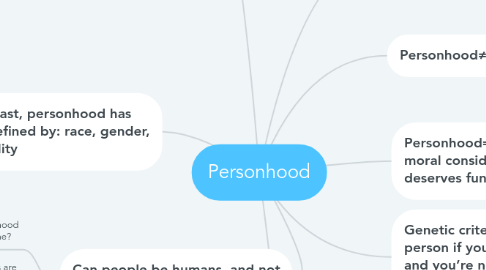Personhood
von Paul Yan

1. Personhood: who should be considered persons?
1.1. According to Descartes: if they are able to think rationally, then that constitutes a person. “I think, therefore I am.”
1.1.1. Some people extend definition of personhood to include the fact that if you had these qualifying attributes to be a person in the past, but have lost them at some point in time. This is to include people who are in a constant vegetative state or severe brain damage.
1.2. Sentience definition: if the entity has consciousness of sensation, that is, of pleasure and pain, called sentience. According to this view, animals should be defined as persons. And if machines can feel pain or pleasure, then they too are legal persons. People with various neurological disabilities won’t be considered persons under this definition.
1.3. Souls definition: According to this view, we have a soul at the moment at conception.
1.4. According to Australian philosopher Michael Tooley, a person “must have a concept of self that continues over time, as well as a particular interest in his or her own continued existence.” He therefore excludes fetuses and small children personhood.
2. In the past, personhood has been defined by: race, gender, and ability
2.1. Until 1993, Canadian Elections Act banned mentally disabled people from voting
2.2. FNMI did not have the right to vote until 1960
2.3. Women weren’t allowed to vote in federal elections until 1918. Were not considered legal persons until 1928.
3. Can people be humans, and not be persons?
3.1. Can you surrender your personhood by committing an atrocious crime?
3.2. Some people believe that fetuses are not persons, even if they are humans.
3.3. Other people also think that people on persistent vegetative states are not considered persons.
4. Criteria for Personhood: Mary Ann Warren
4.1. 1. Consciousness 2. Reasoning 3. Self-motivated activity 4. Capacity to communicate 5. Self-awareness. Known as cognitive criteria. Also rules out young children personhood.
5. Social criterion: Your a person whenever society recognizes you as a person, or whenever someone cares about you.
6. Personhood≠Human being
6.1. Human being=someone who has the biological DNA of a human
7. Personhood=involvement in moral consideration, and who deserves fundamental rights
8. Genetic criterion: You’re a person if you have human DNA, and you’re not a person if you don’t.
8.1. Implications are very problematic. Super man isn’t a person according to this definition


